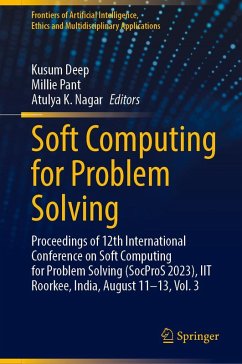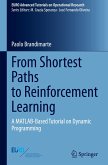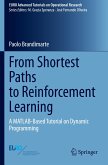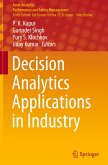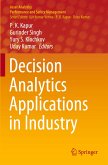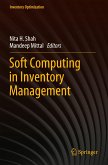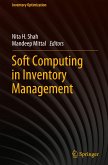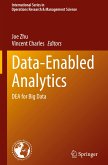Soft Computing for Problem Solving
Proceedings of 12th International Conference on Soft Computing for Problem Solving (SocProS 2023), IIT Roorkee, India, August 11-13, Vol. 3
Herausgegeben:Deep, Kusum; Pant, Millie; Nagar, Atulya K.
Soft Computing for Problem Solving
Proceedings of 12th International Conference on Soft Computing for Problem Solving (SocProS 2023), IIT Roorkee, India, August 11-13, Vol. 3
Herausgegeben:Deep, Kusum; Pant, Millie; Nagar, Atulya K.
- Gebundenes Buch
- Merkliste
- Auf die Merkliste
- Bewerten Bewerten
- Teilen
- Produkt teilen
- Produkterinnerung
- Produkterinnerung
This proceedings volume presents 41 high-quality research contributions at the forefront of soft computing theory and applications and real-world impact. The third volume from this conference, its chapters reflect the current trajectory of soft computing research, covering advances in machine learning, neural networks, fuzzy systems, nature-inspired algorithms, and big data analytics. Applications discussed range across critical domains such as healthcare, education, legal systems, cybersecurity, environmental monitoring, and industrial automation. Noteworthy contributions include studies on…mehr
Andere Kunden interessierten sich auch für
![From Shortest Paths to Reinforcement Learning From Shortest Paths to Reinforcement Learning]() Paolo BrandimarteFrom Shortest Paths to Reinforcement Learning83,99 €
Paolo BrandimarteFrom Shortest Paths to Reinforcement Learning83,99 €![From Shortest Paths to Reinforcement Learning From Shortest Paths to Reinforcement Learning]() Paolo BrandimarteFrom Shortest Paths to Reinforcement Learning61,99 €
Paolo BrandimarteFrom Shortest Paths to Reinforcement Learning61,99 €![Decision Analytics Applications in Industry Decision Analytics Applications in Industry]() Decision Analytics Applications in Industry113,99 €
Decision Analytics Applications in Industry113,99 €![Decision Analytics Applications in Industry Decision Analytics Applications in Industry]() Decision Analytics Applications in Industry113,99 €
Decision Analytics Applications in Industry113,99 €![Soft Computing in Inventory Management Soft Computing in Inventory Management]() Soft Computing in Inventory Management106,99 €
Soft Computing in Inventory Management106,99 €![Soft Computing in Inventory Management Soft Computing in Inventory Management]() Soft Computing in Inventory Management106,99 €
Soft Computing in Inventory Management106,99 €![Data-Enabled Analytics Data-Enabled Analytics]() Data-Enabled Analytics113,99 €
Data-Enabled Analytics113,99 €-
-
-
This proceedings volume presents 41 high-quality research contributions at the forefront of soft computing theory and applications and real-world impact. The third volume from this conference, its chapters reflect the current trajectory of soft computing research, covering advances in machine learning, neural networks, fuzzy systems, nature-inspired algorithms, and big data analytics. Applications discussed range across critical domains such as healthcare, education, legal systems, cybersecurity, environmental monitoring, and industrial automation. Noteworthy contributions include studies on smart assistive devices for Alzheimer s patients, intelligent classification of recycled materials, and AI-based criminal face detection systems. On the theoretical side, the volume includes novel algorithmic developments such as the Shuffled Flamingo Search Algorithm and structural insights into swarm-based optimisation.
The volume illustrates how soft computing continues to address complex real-world problems through adaptive, scalable, and human-centric approaches. It also captures the spirit of interdisciplinary engagement, with contributions from early-career researchers alongside seasoned academics, enriching the community s collaborative potential. This book will be of interest to researchers, engineers, practitioners, and postgraduate students working in artificial intelligence, optimisation, and computational intelligence, particularly those interested in the translational impact of soft computing across diverse sectors.
The volume illustrates how soft computing continues to address complex real-world problems through adaptive, scalable, and human-centric approaches. It also captures the spirit of interdisciplinary engagement, with contributions from early-career researchers alongside seasoned academics, enriching the community s collaborative potential. This book will be of interest to researchers, engineers, practitioners, and postgraduate students working in artificial intelligence, optimisation, and computational intelligence, particularly those interested in the translational impact of soft computing across diverse sectors.
Produktdetails
- Produktdetails
- Frontiers of Artificial Intelligence, Ethics and Multidisciplinary Applications
- Verlag: Springer / Springer Nature Singapore / Springer, Berlin
- Artikelnr. des Verlages: 978-981-96-8455-7
- Seitenzahl: 812
- Erscheinungstermin: 27. September 2025
- Englisch
- Abmessung: 241mm x 160mm x 49mm
- Gewicht: 1365g
- ISBN-13: 9789819684557
- ISBN-10: 9819684552
- Artikelnr.: 74212588
- Herstellerkennzeichnung
- Springer-Verlag GmbH
- Tiergartenstr. 17
- 69121 Heidelberg
- ProductSafety@springernature.com
- Frontiers of Artificial Intelligence, Ethics and Multidisciplinary Applications
- Verlag: Springer / Springer Nature Singapore / Springer, Berlin
- Artikelnr. des Verlages: 978-981-96-8455-7
- Seitenzahl: 812
- Erscheinungstermin: 27. September 2025
- Englisch
- Abmessung: 241mm x 160mm x 49mm
- Gewicht: 1365g
- ISBN-13: 9789819684557
- ISBN-10: 9819684552
- Artikelnr.: 74212588
- Herstellerkennzeichnung
- Springer-Verlag GmbH
- Tiergartenstr. 17
- 69121 Heidelberg
- ProductSafety@springernature.com
Kusum Deep is Emeritus Professor with the Department of Mathematics, as well as Joint Faculty at the MF School of Data Science and Artificial Intelligence, at the Indian Institute of Technology (IIT) Roorkee, India. She is Visiting Professor, Liverpool Hope University, UK. She is a post-doctoral Fellow at Loughborough University, UK, assisted by International Bursary funded by Commission of European Communities, Brussels. She has won numerous awards like Khosla Research Award; UGC Career Award; Starred Performer of IITR Faculty; special facilitation in memory of late Prof. M. C. Puri; AIAP Excellence Award. She is features in the ebook “Women in STEM-2021” celebrating contributions made by 50 Indian women in STEM published by Confederation of Indian Industries. She falls within top 2% of scientists in the world since 2019 till date (Stanford University). In 2021 she bagged the prestigious POWER grant awarded by SERB-DST, Govt. of India. Since 2022 she is leading a collaborative consultancy project on AI and Machine Learning funded by Deloitte. She has authored two books, supervised 24 PhDs, and published 135 research papers. She is one of the Editors of Engineering Applications of Artificial Intelligence and many reputed journals. Her research interests are nature inspired optimization techniques, particularly evolutionary algorithms and swarm intelligence techniques and their applications to solve real life problems as well as artificial intelligence and machine learning. Millie Pant is Professor at the Department of Applied Mathematics and Scientific Computing (DAMSC), Saharanpur Campus of Indian Institute of Technology Roorkee, joint faculty at the Mehta Family School of Data Science and Artificial Intelligence at the Indian Institute of Technology Roorkee and adjunct faculty at AIT Thailand, Bangkok. Her expertise is in optimization algorithms, soft computing techniques, image processing, and decision-making processes. She has published more than 200 research articles in various journals and conferences of national and international repute. She has supervised 14 Ph.D. students and currently 10 students are doing Ph.D. under her supervision. She has completed 4 bilateral sponsored projects with Germany and Russia, UK and Czech Republic and two national projects sponsored by DST and DRDO. She has conducted several short-term courses sponsored by Deloitte, TSW, DST, and QIP in the areas of optimization, evolutionary algorithms, and artificial intelligence. She is one of the founder chairs for SocProS conferences and has been the chair of several other conferences as well. Atulya K. Nagar is Foundation Chair and Professor of Mathematical Sciences, currently serving as Pro-Vice-Chancellor for Research at Liverpool Hope University, UK. He previously held leadership roles as Founding Dean of the Faculty of Science and inaugural Head of the School of Mathematics, Computer Science and Engineering at the institution. Before joining Liverpool Hope in 2001, he held academic posts at the University of York, Brunel University London, and others. He holds visiting professorships at several leading Indian institutions, including IIT Roorkee, South Asian University, and the University of Madras, where he was appointed as the Sir CV Raman Chair, supported by the Nobel laureate Sir CV Raman Endowment funds. Internationally recognised, his research focuses on nonlinear mathematics and computational methods with real-world applications in science and industry. He has authored over 550 publications, edited volumes on applied mathematics and AI, and co-edits two Springer book series. He serves on editorial boards and has been Editor-in-Chief of prestigious AI and Mathematics journals. He sits on strategic bodies including the JISC Research Strategy Group, UKRI Talent Panel College, REF-2029 People, Culture and Environment (PCE) Pilot Panel, and EPSRC’s Impact Accelerator Panel. He is a Fellow of the Institute of Mathematics and its Applications (FIMA) and a Fellow of the Higher Education Academy (FHEA).
IoT Based Smartbin for Smart Campus.- Aspect of Artificial Intelligence in Dealing with Mental Health Disorders in Adolescents.- Mathematical Modeling and Analysis of Spread of Crime in a Society.- Approximate Solution of Kawahara KdV and modified Kawahara KdV Equation by using RDTM.- Dental Hand Gesture Recogniser.- A Prototype using Data Analytics for Crowd Management at Football Stadiums.- Smart Glasses and Virtual Assistance Guide for Detection of Disorientation for Dementia and Alzheimer's.- Smart Home Automation System Using an IoT-Based Approach for Monitoring and Remote Control of Household Equipment.- Hand Gesture Recognition Automation System.- Beyond Traditional Metrics: Driver Drowsiness Detection Detection Systems Evaluation using Xception and ResNet152v2 Models.- A State-of-the-Art Review on Genetic algorithm and Particle Swarm optimization.- Improved constructive heuristics to minimize total flow-time in distributed permutation flowshop scheduling problem.- Technological and societal aspects of India national security.- Home Automation Using a Cloud Environment.- Mathematical Modeling of AIDS Prevention Measures Due to Opportunistic Infections.- Crypto-Encoding Multiple Medical Image Watermarking Technique for Electronic Health Record.- Multi-Criteria Decision Making approach for Forest Fire Management: A case study of Uttarakhand Shuffled Flamingo Search (ShFSA) Algorithm.- A Hybrid Model For Rain Prediction Using Machine Learning Algorithm.- Quality Assessment of School Management System in India through Data Envelopment Analysis.- Solving Geometric Programming Problems with Laplace Uncertainty Distribution.- Simulation of Data Flow Diagram using Coloured Petri Net SCP-CNN: Skin Cancer Prediction on Imbalanced Dataset Using CNN Deep Learning Customer Segmentation in Online Shoppers Purchasing Intention.- AI in the Legal System: Transforming Legal Practice through Artificial Intelligence and its Impact during Covid19.- Object Detection Techniques for a Novel Traffic Dataset using real-time Infrared Imagery.- Sentiment Recognition Through Speech Using Deep Learning Model.- A Comparative Analysis of Big Data Analytics in Cloud Computing.- A Survey: Image Processing Techniques for Detecting Rice Crop Disease.- A Hybrid Variant SOMGOA for Unconstrained Optimization.- BERT Algorithm and its Methodology for Sentiments Analysis: A Survey.- Automated Gestational Age Prediction: A Systematic Review.- Analyzing the Function, Weight, and Use Cases of Ordered Weighted Averaging Operators in Fuzzy Logic.- A Multi-Criteria Decision Making Approach for Country-Wise Ranking in Sugarcane Production.- A University Admittance Predictor using Stacked Ensemble Learning.- Detection And Prevention of Game Addiction in Children.- Big Data Analytics for Diabetes Mellitus: Leveraging Hadoop Framework and Power BI for Improved Healthcare Insights.- Develop and Analyze Custom Applications in Cloud Using Salesforce.- Levitation of a Small Particle using Arduino Uno in Resonant Levitator.- PLC Based Inventory Logistic Management System In Textile.- Employing Machine Learning for Criminal Face Detection System.- Smart Agriculture With The Internet Of Things: Improving Productivity, Sustainability, And Crop Yield.- Assessment of Hostels for Higher Education Institute through Principal Component Analysis enabled DEA.- Anchor words inference for Stochastic Matrix Factorization.- Polyethylene Classification into Virgin and Recycled: A Machine Learning Approach.- An overview of software resources for multi-objective optimisation.- Performance Assessment of Selected Indian Pulp and Paper Mills through two-stage network.- Time Series Forecasting of Sugarcane Production in India.- Hough Transform Generalization for Detecting Fuzzy Line.- Performance Assessment of Indian States Towards Sustainable Development Goals: A Comparative Analysis using TOPSIS and Clustering Algorithm.- Examining Structural Bias in Salp Swarm Algorithm and Its Two Variants using Signature Test: A Theoretical Study.- An application of two-stage network DEA model with desirable and undesirable outputs.- Comparision Analysis of the Structural Biased of MPA and OLMPA.- Comparative Performance of Five Population-based Algorithms for Asymmetric Travelling Salesman Problem.- Establishing the Linkage between Industry 4.0 Applications and Circular Supply Chain Performance for SMEs: An Overview.- Population Dynamics in the Whale Optimization Algorithm: A Theoretical Investigation of Structural Bias.- Comparative Analysis of Pre-trained Deep Learning Models for Classification between Diseased and Healthy Apple Leaves.- Why Do Cities Hold Cash? Empirical Arguments from Indian Municipal Corporations.- Role of Metaheuristic Algorithms in Classification and Clustering: A State of the Art.- Two Dimensional Finite Element Model of Interdependent Ca2 + and IP3 Dynamics in T Lymphocyte.- A Generalized Two and Three Phase Software Reliability Growth Model Incorporating Testing Coverage and Imperfect Debugging Process.
IoT Based Smartbin for Smart Campus.- Aspect of Artificial Intelligence in Dealing with Mental Health Disorders in Adolescents.- Mathematical Modeling and Analysis of Spread of Crime in a Society.- Approximate Solution of Kawahara KdV and modified Kawahara KdV Equation by using RDTM.- Dental Hand Gesture Recogniser.- A Prototype using Data Analytics for Crowd Management at Football Stadiums.- Smart Glasses and Virtual Assistance Guide for Detection of Disorientation for Dementia and Alzheimer's.- Smart Home Automation System Using an IoT-Based Approach for Monitoring and Remote Control of Household Equipment.- Hand Gesture Recognition Automation System.- Beyond Traditional Metrics: Driver Drowsiness Detection Detection Systems Evaluation using Xception and ResNet152v2 Models.- A State-of-the-Art Review on Genetic algorithm and Particle Swarm optimization.- Improved constructive heuristics to minimize total flow-time in distributed permutation flowshop scheduling problem.- Technological and societal aspects of India national security.- Home Automation Using a Cloud Environment.- Mathematical Modeling of AIDS Prevention Measures Due to Opportunistic Infections.- Crypto-Encoding Multiple Medical Image Watermarking Technique for Electronic Health Record.- Multi-Criteria Decision Making approach for Forest Fire Management: A case study of Uttarakhand Shuffled Flamingo Search (ShFSA) Algorithm.- A Hybrid Model For Rain Prediction Using Machine Learning Algorithm.- Quality Assessment of School Management System in India through Data Envelopment Analysis.- Solving Geometric Programming Problems with Laplace Uncertainty Distribution.- Simulation of Data Flow Diagram using Coloured Petri Net SCP-CNN: Skin Cancer Prediction on Imbalanced Dataset Using CNN Deep Learning Customer Segmentation in Online Shoppers Purchasing Intention.- AI in the Legal System: Transforming Legal Practice through Artificial Intelligence and its Impact during Covid19.- Object Detection Techniques for a Novel Traffic Dataset using real-time Infrared Imagery.- Sentiment Recognition Through Speech Using Deep Learning Model.- A Comparative Analysis of Big Data Analytics in Cloud Computing.- A Survey: Image Processing Techniques for Detecting Rice Crop Disease.- A Hybrid Variant SOMGOA for Unconstrained Optimization.- BERT Algorithm and its Methodology for Sentiments Analysis: A Survey.- Automated Gestational Age Prediction: A Systematic Review.- Analyzing the Function, Weight, and Use Cases of Ordered Weighted Averaging Operators in Fuzzy Logic.- A Multi-Criteria Decision Making Approach for Country-Wise Ranking in Sugarcane Production.- A University Admittance Predictor using Stacked Ensemble Learning.- Detection And Prevention of Game Addiction in Children.- Big Data Analytics for Diabetes Mellitus: Leveraging Hadoop Framework and Power BI for Improved Healthcare Insights.- Develop and Analyze Custom Applications in Cloud Using Salesforce.- Levitation of a Small Particle using Arduino Uno in Resonant Levitator.- PLC Based Inventory Logistic Management System In Textile.- Employing Machine Learning for Criminal Face Detection System.- Smart Agriculture With The Internet Of Things: Improving Productivity, Sustainability, And Crop Yield.- Assessment of Hostels for Higher Education Institute through Principal Component Analysis enabled DEA.- Anchor words inference for Stochastic Matrix Factorization.- Polyethylene Classification into Virgin and Recycled: A Machine Learning Approach.- An overview of software resources for multi-objective optimisation.- Performance Assessment of Selected Indian Pulp and Paper Mills through two-stage network.- Time Series Forecasting of Sugarcane Production in India.- Hough Transform Generalization for Detecting Fuzzy Line.- Performance Assessment of Indian States Towards Sustainable Development Goals: A Comparative Analysis using TOPSIS and Clustering Algorithm.- Examining Structural Bias in Salp Swarm Algorithm and Its Two Variants using Signature Test: A Theoretical Study.- An application of two-stage network DEA model with desirable and undesirable outputs.- Comparision Analysis of the Structural Biased of MPA and OLMPA.- Comparative Performance of Five Population-based Algorithms for Asymmetric Travelling Salesman Problem.- Establishing the Linkage between Industry 4.0 Applications and Circular Supply Chain Performance for SMEs: An Overview.- Population Dynamics in the Whale Optimization Algorithm: A Theoretical Investigation of Structural Bias.- Comparative Analysis of Pre-trained Deep Learning Models for Classification between Diseased and Healthy Apple Leaves.- Why Do Cities Hold Cash? Empirical Arguments from Indian Municipal Corporations.- Role of Metaheuristic Algorithms in Classification and Clustering: A State of the Art.- Two Dimensional Finite Element Model of Interdependent Ca2 + and IP3 Dynamics in T Lymphocyte.- A Generalized Two and Three Phase Software Reliability Growth Model Incorporating Testing Coverage and Imperfect Debugging Process.

